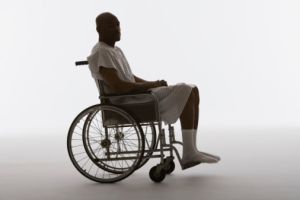Paralysis

Paralysis, or the loss of muscle function in part of your body, can have profound impacts on a person's life. It can result from various factors, affecting not just the physical abilities but also the emotional and psychological well-being of an individual. Let’s explore this topic in more detail:
Types of Paralysis[edit | edit source]
- Localized Paralysis: This affects only a specific part of the body, such as the face or a limb.
- Generalized Paralysis: This affects a larger region or even the entire body. It includes:
- Monoplegia: Paralysis of a single limb.
- Hemiplegia: Paralysis of one side of the body.
- Paraplegia: Paralysis below the waist, affecting both legs.
- Quadriplegia: Paralysis below the neck, affecting all four limbs.
Causes of Paralysis[edit | edit source]
- Neurological Conditions: Such as stroke, multiple sclerosis, or cerebral palsy.
- Injuries: Spinal cord injuries or traumatic brain injuries.
- Infections: Polio and other viral infections.
- Autoimmune Disorders: Conditions like Guillain-Barré syndrome.
- Genetic Disorders: Such as muscular dystrophy.
Symptoms and Diagnosis[edit | edit source]
- Loss of Sensation: Inability to feel touch or pain in the affected area.
- Muscle Atrophy: Wasting away of muscles due to lack of use.
- Spasms: Involuntary muscle contractions.
- Diagnostics: Often involves MRI, CT scans, and electromyography to understand the extent and location of the damage.
Treatments and Management[edit | edit source]
- Physical Therapy: To maintain muscle tone and improve mobility.
- Occupational Therapy: To help patients adapt to daily activities.
- Medications: To manage pain and muscle spasms.
- Surgical Interventions: In some cases, surgery might be necessary to repair nerve damage.
- Assistive Devices: Wheelchairs, braces, or other mobility aids.
Living with Paralysis[edit | edit source]
- Psychological Support: Counseling and support groups to help with the emotional aspects.
- Home Modifications: Adapting living spaces to be more accessible.
- Community Resources: Support from local organizations and resources for those living with paralysis.
Inspiring Stories[edit | edit source]
Many individuals with paralysis have overcome significant challenges and achieved remarkable things. For instance, Christopher Reeve, the actor best known for his role as Superman, became an advocate for spinal cord injury research after a horse-riding accident left him quadriplegic.
Paralysis can be a life-changing condition, but with the right support and resources, individuals can lead fulfilling lives. If you have specific questions about a certain type or cause of paralysis, feel free to ask!